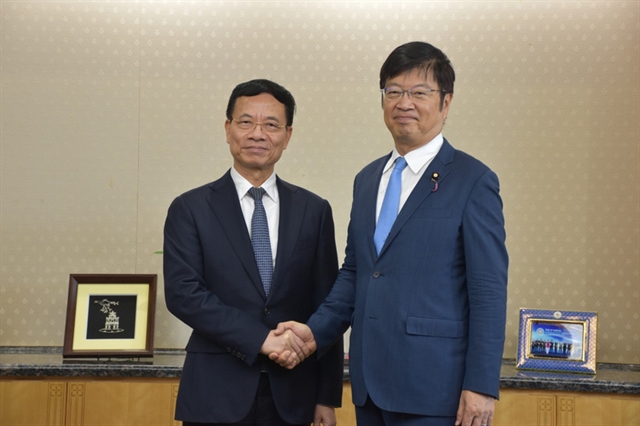 Society
Society


|
| State Minister for Internal Affairs and Communications of Japan, Adachi Masashi, welcomes Minister of Science and Technology Nguyễn Mạnh Hùng (left) and the Vietnamese delegation on their visit to Japan. VNA/VNS Photo |
TOKYO — Vietnamese scientists, experts and businesses in Japan gathered at a seminar in Tokyo on October 2 to discuss ways to promote research and development of strategic technologies, with a focus on “Chip Edge AI”.
Jointly organised by the Vietnamese Embassy in Japan, FPT Japan, and the Vietnam Digital Transformation Association in Japan (VADX), the event was attended by a delegation from the Ministry of Science and Technology (MoST), led by Minister Nguyễn Mạnh Hùng, along with Vietnamese scientists and business representatives in Japan.
Opening the event, Vietnamese Ambassador to Japan Phạm Quang Hiệu highlighted the significant contributions of the Vietnamese community in Japan, which now numbers more than 650,000, including nearly 1,000 scientists and intellectuals. He underlined that their research achievements are not only widely published in prestigious academic journals but also recognised through patents granted in Japan, many of which have been transferred to Japanese and foreign enterprises for development and commercialisation. The ambassador stressed that this valuable intellectual resource needs to be effectively connected and transformed into economic value through state support and enterprise-led commercialisation.
Hiệu reaffirmed the importance of cooperation between the State, scientists and businesses in driving innovation and advancing science and technology. The seminar provided a platform to discuss proposals for collaboration, with a particular focus on developing specialised chips for Việt Nam. It also offered an opportunity for Vietnamese intellectuals in Japan to gain deeper insights into Việt Nam’s policies on attracting overseas Vietnamese scientists to contribute to strategic technology development.
Five keynote presentations were delivered by Vietnamese scientists, covering topics such as Việt Nam’s opportunities in Edge AI chip development, strategies for advancing strategic technology products, FPT’s approach to AI, applications of specialised AI chips in personalised healthcare, and strengthening cooperation between domestic and international universities in research and product development.
Speaking to a Vietnam News Agency correspondent in Japan, Professor Phạm Nam Hải from Tokyo Institute of Technology noted that the AI revolution is currently dominated by cloud-based systems run by major corporations, which face challenges of high energy consumption, heavy data transmission and personal data security risks. He emphasised the importance of developing edge AI systems that process directly on end-user devices, supported by advanced memory and energy-efficient architectures.
Hải explained that his laboratory is working with leading global technology firms to develop SOT-MRAM, a new memory technology for AI applications. If successfully commercialised, this could form the basis for a startup, in which Việt Nam could participate by investing, developing software, and creating end-user applications. He expressed his hope that Việt Nam would establish venture capital funds to support such startups, particularly in emerging fields like AI.
Minister Hùng, in his keynote remarks, affirmed that the Vietnamese Government regards semiconductors as a strategic industry. He welcomed the proposals shared by Vietnamese scientists, noting that their approaches reflect both humanity and sustainability, aligning with global trends of reducing energy consumption and protecting the natural environment. He pledged that the Government will accompany and support Vietnamese scientists in developing core technologies for national growth.
At the seminar, Hùng and delegates officially launched the V-S.T.I.D Platform, designed to connect overseas Vietnamese intellectuals with ministries, localities, research institutes, universities, and businesses in Việt Nam. — VNS




